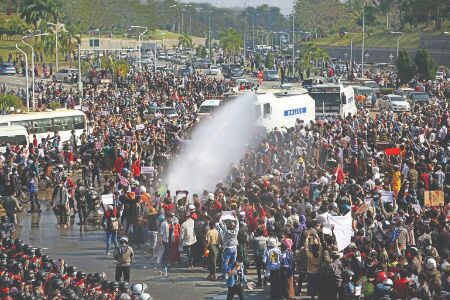Water fired at crowd as anti-coup protests swell in Myanmar

Yangon: Police fired a water cannon Monday at hundreds of protesters in Myanmar's capital who are demanding the military hand power back to elected officials, as demonstrations against last week's coup intensified and spread to more parts of the country.
The demonstrations in Naypyitaw, ongoing for several days, are especially significant since the city, whose population includes many civil servants and their families, has no tradition of protest and has a heavy military presence.
A protest also swelled at a major downtown intersection in the country's largest city, Yangon, with people chanting slogans, raising a three-finger salute that is a symbol of resistance and carrying placards saying, Reject the military coup and Justice for Myanmar."
There were also reports of new demonstrations in towns in the north, southeast and east of the country, as well as in the city of Mandalay, where there was a procession of marchers and motorbikes.
We do not want the military junta, said Daw Moe, a protester in Yangon. We never ever wanted this junta. Nobody wants it. All the people are ready to fight them.
State media for the first time on Monday made reference to the protests, claiming they were endangering the country's stability.
Democracy can be destroyed if there is no discipline, according to a statement from the Ministry of Information, read on state television station MRTV. We will have to take legal actions to prevent acts that are violating state stability, public safety and the rule of law.
The coup was seen internationally as a shocking setback for Myanmar, which had been making progress toward democracy in recent years after five decades of military rule. The takeover came the day newly elected lawmakers were supposed to take their seats in Parliament after November elections. The generals have said that vote was marred by fraud though the country's election commission has dismissed that claim.
The growing protests recall previous movements in the Southeast Asian country's long and bloody struggle for democracy. On Sunday, tens of thousands of protesters rallied at the city's Sule Pagoda, which was a focal point of demonstrations against military rule during a massive 1988 uprising and again during a 2007 revolt led by Buddhist monks. The military used deadly force to end both of those uprisings. Aside from a few officers, soldiers have not been in the streets at protests this past week.
Photos of the standoff in Naypyitaw on Monday showed a vast crowd of protesters hemmed in on several sides by large numbers of police and police vehicles. Officers there trained a water cannon on the crowd, which was gathered near a giant statue of Aung San, who led the country's 1940s fight for independence from Britain and is the father of Aung San Suu Kyi, the elected leader who was deposed by last week's takeover. Suu Kyi who became an international symbol of the country's fight for freedom while detained in her home for 15 years and earned the Nobel Peace Prize for her efforts is now back under house arrest.



